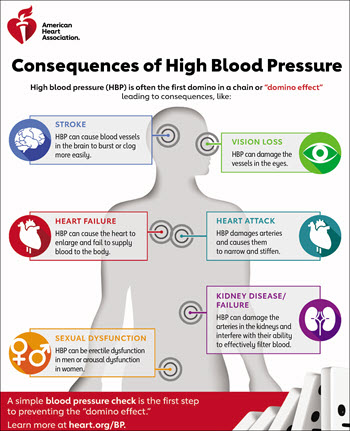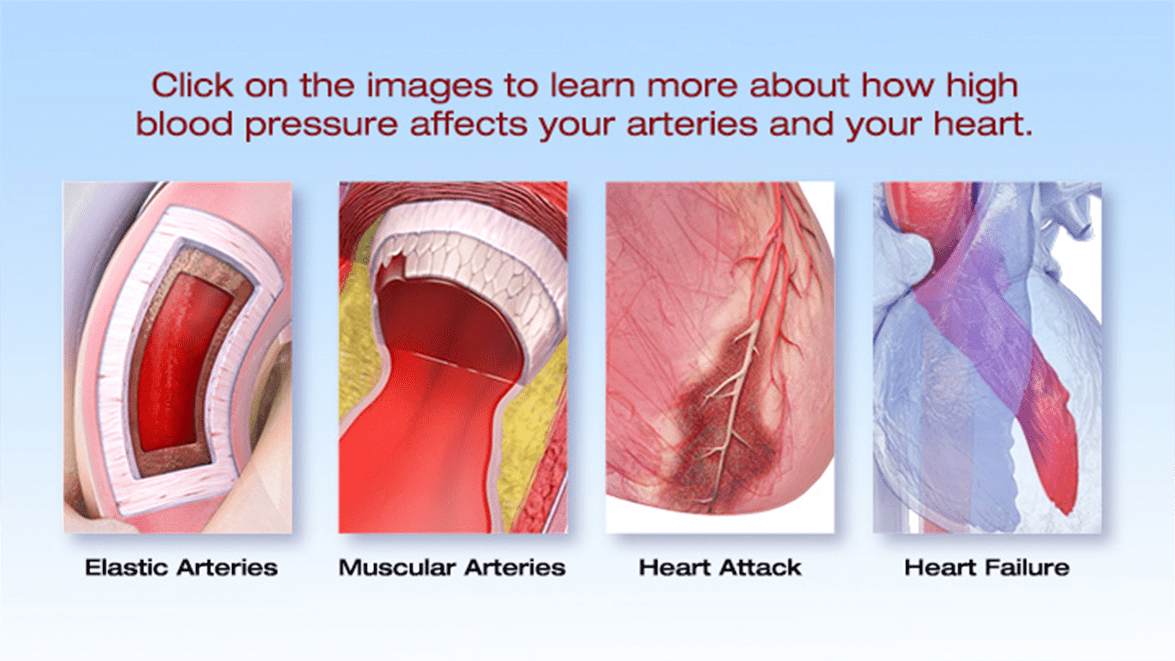Amenazas para la salud provocadas por la presión arterial alta
Datos de interés
- La presión arterial alta sin detectar ni controlar puede provocar muchos problemas de salud.
- Si sufres de presión arterial alta, es importante que hagas cambios para reducir el riesgo de que se presenten otros problemas de salud.
La hipertensión arterial amenaza la salud y la calidad de vida
En la mayoría de los casos, los daños causados por la presión arterial alta (también conocida como hipertensión) se producen con el tiempo. Si no se detecta ni se controla, la presión arterial alta puede provocar lo siguiente:
- Ataque cardíaco: las arterias pueden obstruirse e impedir que llegue el flujo sanguíneo al músculo cardíaco.
- Ataque o derrame cerebral: los vasos sanguíneos que suministran sangre y oxígeno al cerebro se obstruyen o revientan.
- Insuficiencia cardíaca: la presión arterial alta hace que el corazón trabaje con mayor intensidad. Esto puede provocar que el corazón aumente de tamaño y tenga dificultades para bombear suficiente sangre al cuerpo.
- Enfermedad o insuficiencia renal: los daños en las arterias alrededor de los riñones pueden impedir que estos filtren la sangre correctamente.
- Pérdida de la visión: los vasos sanguíneos de los ojos pueden tensarse o dañarse.
- Disfunción sexual: la presión arterial alta puede provocar disfunción eréctil (incapacidad para tener o mantener una erección) en los hombres y puede disminuir el deseo sexual en las mujeres.
- Enfermedades cardíacas: con el tiempo, la presión arterial alta puede provocar enfermedades cardíacas. La angina es un dolor en el pecho que constituye un síntoma común.
- Arteriosclerosis (acumulación de placa en las arterias): la presión arterial alta puede dañar las arterias del cuerpo y permitir la acumulación de placa.

Ve la infografía sobre las consecuencias de la presión arterial alta: Inglés (PDF) | Español (PDF) | Chino tradicional (PDF) | Chino simplificado (PDF)
¿Cómo puede la hipertensión causar otros problemas de salud?
Cuando la presión arterial permanece alta durante demasiado tiempo, puede dañar las paredes de los vasos sanguíneos y producir pequeños desgarros. Para reparar estas zonas dañadas, el organismo envía células especiales que se adhieren al lugar. Con el tiempo, sustancias como el colesterol y las grasas también pueden acumularse en estos puntos dañados y formar placa.
A medida que la placa se acumula lentamente, un proceso denominado arteriosclerosis puede estrechar el interior de las arterias. Este estrechamiento puede bloquear el flujo sanguíneo, lo que aumenta el riesgo de sufrir afecciones graves como un ataque cardíaco o un ataque o derrame cerebral.
Protégete
- Conoce tus cifras. La mejor manera de saber si tienes hipertensión arterial es hacerte una revisión de la presión arterial. Puedes medirte la presión arterial en casa o en lugares públicos que dispongan de tensiómetros, pero solo un profesional de la salud puede diagnosticar la presión arterial alta.
- Aprende qué factores podrían aumentar tus probabilidades de desarrollar presión arterial alta y otros problemas de salud graves.
- Hacer cambios importantes. Toma medidas para reducir el riesgo y controlar tu presión arterial:
- Haz cambios de estilo de vida que sean saludables para el corazón.
- Tomar tus medicamentos según las indicaciones del médico.
- Colabora con los profesionales de la salud.
La hipertensión arterial y la crisis hipertensiva
En caso de hipertensión grave, si tu presión arterial es superior a 180/120 mm Hg:
- Espera al menos 1 minuto.
- Vuelve a medirte la presión arterial.
Si el segundo resultado sigue igual de alto, fíjate si tienes alguno de estos síntomas:
- Dolor del pecho
- Dificultad para respirar
- Dolor de espalda
- Entumecimiento
- Debilidad
- Cambios en la visión
- Dificultad para hablar
Si no tienes ninguno de estos síntomas ni ningún otro síntoma nuevo y preocupante, es probable que tengas hipertensión grave. Contacta a tu profesional de la salud, quien podría iniciar o ajustar tu medicación para la presión arterial.
En caso de crisis hipertensiva, llama al 911 si tu presión arterial es superior a 180/120 mm Hg y presentas síntomas que pueden incluir:
- Dolor del pecho
- Dificultad para respirar
- Dolor de espalda
- Entumecimiento
- Debilidad
- Cambios en la visión
- Dificultad para hablar
Presión arterial alta y síndrome metabólico
El síndrome metabólico es un conjunto de factores que aumentan el riesgo de padecer problemas de salud graves, como enfermedades cardíacas, diabetes y ataques o derrames cerebrales. La presión arterial alta es uno de esos factores. El síndrome metabólico puede diagnosticarse cuando se presentan tres o más de las siguientes condiciones:
- Alto nivel de glucemia (azúcar)
- Niveles bajos de colesterol HDL en la sangre (el HDL es el tipo “bueno”)
- Niveles altos de triglicéridos en la sangre
- Cintura amplia o cuerpo “en forma de manzana”
- Presión arterial alta









